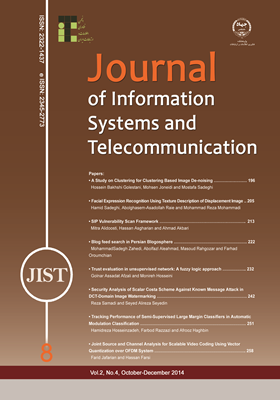A Study on Clustering for Clustering Based Image De-noising
محورهای موضوعی : Image ProcessingHossein Bakhshi Golestani 1 , Mohsen Joneidi 2 , Mostafa Sadeghi 3
1 - Sharif
2 - Sharif
3 - Sharif
کلید واژه: Image de-noising, data clustering, dictionary learning, histogram equalization and sparse representation,
چکیده مقاله :
In this paper, the problem of de-noising of an image contaminated with Additive White Gaussian Noise (AWGN) is studied. This subject is an open problem in signal processing for more than 50 years. In the present paper, we suggest a method based on global clustering of image constructing blocks. As the type of clustering plays an important role in clustering-based de-noising methods, we address two questions about the clustering. The first, which parts of the data should be considered for clustering? The second, what data clustering method is suitable for de-noising? Then clustering is exploited to learn an over complete dictionary. By obtaining sparse decomposition of the noisy image blocks in terms of the dictionary atoms, the de-noised version is achieved. Experimental results show that our dictionary learning framework outperforms its competitors in terms of de-noising performance and execution time.
In this paper, the problem of de-noising of an image contaminated with Additive White Gaussian Noise (AWGN) is studied. This subject is an open problem in signal processing for more than 50 years. In the present paper, we suggest a method based on global clustering of image constructing blocks. As the type of clustering plays an important role in clustering-based de-noising methods, we address two questions about the clustering. The first, which parts of the data should be considered for clustering? The second, what data clustering method is suitable for de-noising? Then clustering is exploited to learn an over complete dictionary. By obtaining sparse decomposition of the noisy image blocks in terms of the dictionary atoms, the de-noised version is achieved. Experimental results show that our dictionary learning framework outperforms its competitors in terms of de-noising performance and execution time.


